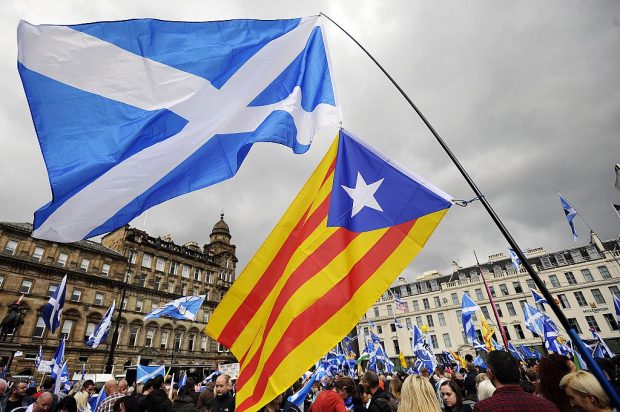It should come as no surprise that the Spanish government has so swiftly rejected Nicola Sturgeon’s proposal of a bespoke Brexit deal for Scotland. Although Spain might have finally ended its ten month political freeze a couple of months ago, the febrile issue of Catalonian independence remains unresolved. Far from quietening down or going away, the secessionist movement in Barcelona is becoming more aggressive and radical. As it does so, the central government in Madrid adopts tougher measures to try and suppress it including, last week, another ruling by its constitutional court against a referendum on the region’s independence. Mariano Rajoy’s administration was never going to agree to a deal for Scotland that would give Catalonian separatists an example to follow or a hero to emulate.
Sturgeon’s key proposal – that Scotland be allowed to remain in the Single Market post-Brexit, even if the rest of the UK leaves – spells danger for the Spanish government for one very simple reason: it would acknowledge Scotland as a separate entity, entitled to its own laws and to negotiate as an autonomous nation. That is everything that Rajoy’s government wants to prevent happening with Catalonia. It’s also why Jorge Toledo, Spanish Secretary of State for the EU, has said that during Brexit talks Spain will deal with ‘only one negotiator – the UK government’. Yet Sturgeon says she will hold another referendum on Scottish independence if her proposals are rejected, as it looks certain they will be by Spain; in that way, too, inspiration for secessionists in Catalonia would come from Scotland.
In Spain, the Catalonia question has become toxic. Jordi Sanchez, president of the pro-secession Catalan National Assembly, has stated that the region’s separation from Spain will be pursued despite last week’s ruling by the constitutional court. In doing so, he risks ending up in court himself – just as Artur Mas, former president of Catalonia, did last autumn for holding a referendum in November in 2014. In that vote, 80 per cent voted for splitting from Spain, although the turnout was less than 50 per cent. It was ruled unconstitutional – and therefore non-binding – by the Spanish courts.
The region’s ex-president, incidentally, is something of a fan of former SNP leader Alex Salmond. When Mas’s pro-independence movement,‘Together for Yes’, won control of the Catalan parliament last September, Salmond publicly congratulated his Spanish counterpart, prompting a letter of thanks and solidarity from the new Catalonian leader. It is partly to stop Sturgeon’s efforts inspiring Mas’s successor, Carles Puigdemont, that Rajoy has rejected her request for differential treatment in the Brexit process.
For their part, the Catalan secessionists claim their approach has only been radicalised by the inflexibility of Madrid’s opposition. Sometimes, it’s not hard to see their point: for example, Carme Forcadell, speaker of the Catalan parliament, was also in court last Friday. Her alleged crime? Allowing a debate in the Catalonian congress on the mechanics of pursuing independence from Spain. The Spanish government’s hostility to Sturgeon is of a piece with its aggressive treatment of Forcadell: both provide clear reminders of just how determined it is to defeat the Catalonian independence movement and similar projects within the EU that might provide it with succour.






Comments